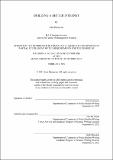Building a Better Internet
Author(s)
Humayun, Zain
DownloadThesis PDF (417.1Kb)
Advisor
De Chant, Tim
Terms of use
Metadata
Show full item recordAbstract
In the summer of 2016, dozens of computer scientists gathered at a former church in San Francisco. For a long time, they had all been worrying about the same thing: the future of the Internet.
Some of those present were dissatisfied with an online world where websites could go down, and the information on them lost forever; others were alarmed by an Internet dominated by a few powerful tech companies, running opaque algorithms and surveilling millions of people. Some believed that the Internet’s nuts and bolts presented easy targets to hackers and enemy states, while others were more concerned about countries censoring the Internet within their own borders.
Those issues seemed to be unrelated, but each reflected a part of the Internet where control was growing concentrated in the hands of a few companies, governments, or infrastructural services: an overarching trend that computer scientists refer to as centralization.
The meeting in California was a call to arms for those trying to organize a countermovement: a mission to save the Internet, to build a better one, and to realize many of its early, unfulfilled promises. In the five years since, has the movement to decentralize the Internet come any closer to success?
Date issued
2022-02Department
Massachusetts Institute of Technology. Graduate Program in Science WritingPublisher
Massachusetts Institute of Technology